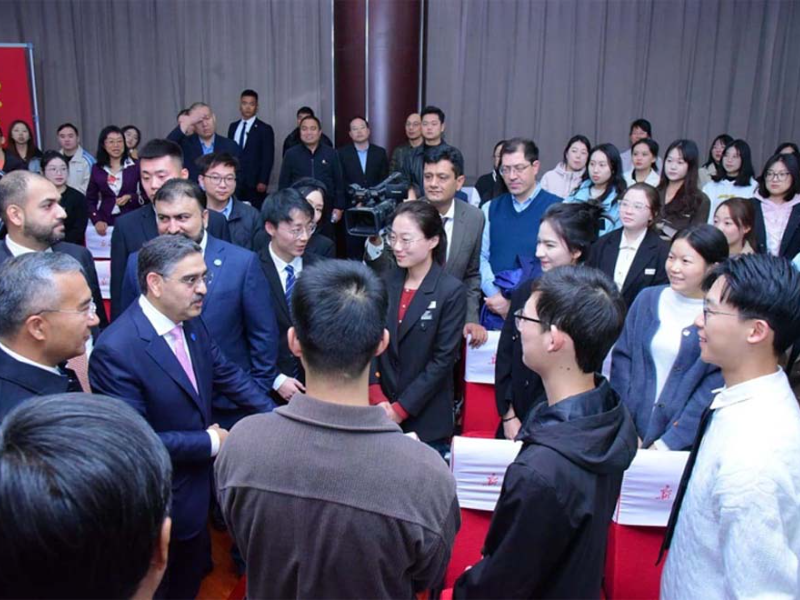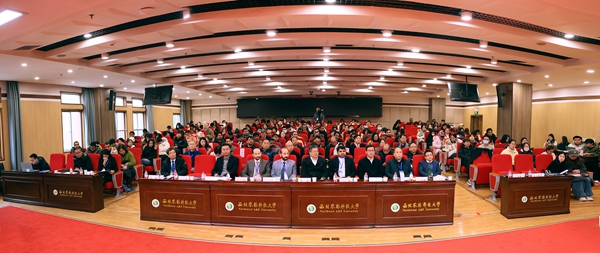ghazi52
PDF THINK TANK: ANALYST

- Joined
- Mar 21, 2007
- Messages
- 104,413
- Reaction score
- 106
- Country
- Location
,.,.,,.
AGENCIES
October 21, 2023
The Khunjerab Pass, a major land trade route between Pakistan and China, would be converted into an all-weather border, caretaker Prime Minister Anwaarul Haq Kakar said at an event as part of the Belt and Road Forum in Beijing on Friday.
Kakar concluded his five-day visit to China, visiting the Xinjiang province in the last leg of the tour.
During the visit, he held fruitful talks with Chinese President Xi Jinping, Premier Li Qiang, besides Russian President Vladimir Putin and the leaders from Kenya and Sri Lanka.
Khunjerab Pass, the highest paved international border at more than 15,000 feet above sea level, is closed during winter months because of harsh weather.
The pass connects Gilgit-Baltistan with China's Xinjiang region. It was reopened in April 2023 following closure because of the Covid outbreak in 2020.
“As per the consensus reached in Beijing during my visit, our land border at Khunjerab-Sost will be converted into an all-weather model,” Kakar said.
He added that they would like to upgrade customs and other logistic services to facilitate trade and movement of people.

Caretaker Prime Minister Anwaarul Haq Kakar interacts with the students of Xinjiang University on 20 October, 2023: PHOTO: PID
In Urumqi, the largest city of Xinjiang, Kakar offered Friday prayer at the main mosque in the city, and addressed a gathering of students and scholars.
The prime minister emphasised the need for deepening trade, connectivity, and cultural ties between Xinjiang and neighbouring regions of Pakistan.
He underscored the importance of Xinjiang as the starting point of the China-Pakistan Economic Corridor, a flagship project under China's Belt and Road Initiative, with more than $65 billion pledged for road, rail, and other infrastructure developments in the South Asian nation.
The prime minister recalled that his recent meetings with the Chinese leadership in Beijing highlighted that both the countries were trusted partners and reliable friends. He commended Xinjiang Production and Construction Corps’ (XPCC) role in peace and development of Xinjiang.
Highlighting the strong institutional linkages between Xinjiang and Pakistan, the prime minister invited the XPCC to explore business and investment opportunities in Pakistan’s industrial development, tourism, agriculture and minerals and mining sectors.
XPCC Deputy Party Secretary Li Yifei said that the government of Xinjiang region looked forward to working with Pakistan to facilitate trade, connectivity, and people-to-people ties via Khunjerab-Sost border crossing
Khunjerab Pass to be ‘upgraded’ to all-weather border
PM Kakar concludes five-day China visit with offering Friday prayer in UrumqiAGENCIES
October 21, 2023
The Khunjerab Pass, a major land trade route between Pakistan and China, would be converted into an all-weather border, caretaker Prime Minister Anwaarul Haq Kakar said at an event as part of the Belt and Road Forum in Beijing on Friday.
Kakar concluded his five-day visit to China, visiting the Xinjiang province in the last leg of the tour.
During the visit, he held fruitful talks with Chinese President Xi Jinping, Premier Li Qiang, besides Russian President Vladimir Putin and the leaders from Kenya and Sri Lanka.
Khunjerab Pass, the highest paved international border at more than 15,000 feet above sea level, is closed during winter months because of harsh weather.
The pass connects Gilgit-Baltistan with China's Xinjiang region. It was reopened in April 2023 following closure because of the Covid outbreak in 2020.
“As per the consensus reached in Beijing during my visit, our land border at Khunjerab-Sost will be converted into an all-weather model,” Kakar said.
He added that they would like to upgrade customs and other logistic services to facilitate trade and movement of people.

Caretaker Prime Minister Anwaarul Haq Kakar interacts with the students of Xinjiang University on 20 October, 2023: PHOTO: PID
In Urumqi, the largest city of Xinjiang, Kakar offered Friday prayer at the main mosque in the city, and addressed a gathering of students and scholars.
The prime minister emphasised the need for deepening trade, connectivity, and cultural ties between Xinjiang and neighbouring regions of Pakistan.
He underscored the importance of Xinjiang as the starting point of the China-Pakistan Economic Corridor, a flagship project under China's Belt and Road Initiative, with more than $65 billion pledged for road, rail, and other infrastructure developments in the South Asian nation.
The prime minister recalled that his recent meetings with the Chinese leadership in Beijing highlighted that both the countries were trusted partners and reliable friends. He commended Xinjiang Production and Construction Corps’ (XPCC) role in peace and development of Xinjiang.
Highlighting the strong institutional linkages between Xinjiang and Pakistan, the prime minister invited the XPCC to explore business and investment opportunities in Pakistan’s industrial development, tourism, agriculture and minerals and mining sectors.
XPCC Deputy Party Secretary Li Yifei said that the government of Xinjiang region looked forward to working with Pakistan to facilitate trade, connectivity, and people-to-people ties via Khunjerab-Sost border crossing


